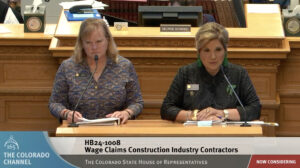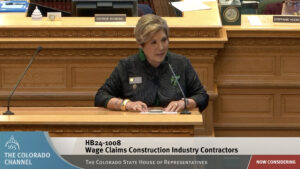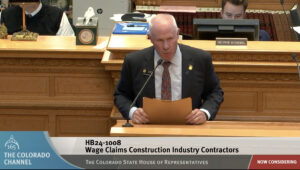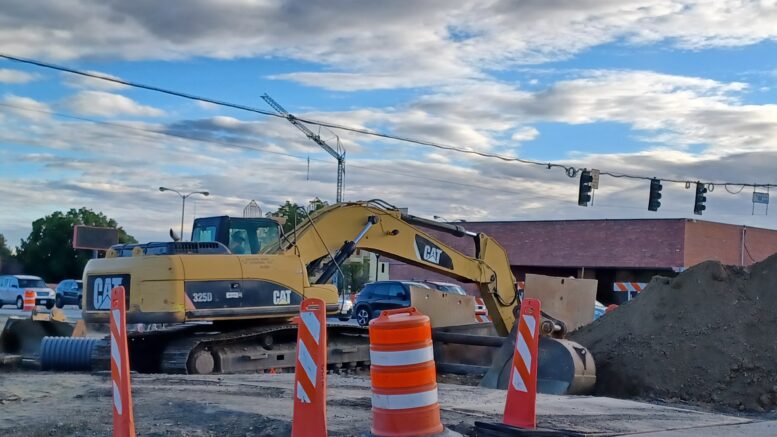Colorado legislators have 10 days left to decide whether to seek to add financial liability to construction-industry general contractors in order to deter wage theft — and put into place a law that could be replicated for other industries in the coming years.
On April 18, the House passed a bill to create joint and severable liability for general contractors in instances where subcontractors fail to pay workers what they have earned. Wage theft refers not just to an outright refusal to give paychecks but also to failure to pay overtime, grant proper breaks or honor benefits that employers have agreed to give.
House Bill 1008, sponsored by Democratic House Majority Leader Monica Duran of Wheat Ridge and Democratic Rep. Meg Froelich of Greenwood Village, passed on a 43-17 vote, with only Democratic Rep. Alex Valdez of Denver joining Republicans in opposing it. Senate President Steve Fenberg assigned it one week later to the Senate Business, Labor & Technology Committee, but it’s yet to be scheduled for its first hearing in that chamber.
What the latest wage-theft bill does

Colorado state Reps. Meg Froelich and Monica Duran speak on the House floor on April 18 about their wage-theft bill.
The bill largely mirrors a roughly year-old Denver ordinance that permits workers snubbed by subcontractors to go up the chain and collect owed payments from higher-level subs and finally the general contractor, with the help of the city auditor’s office. Contractor groups agree with the premise of the government stepping in to make sure that workers get what they’ve earned — but it’s the ways in which HB 1008 differs from the Denver statute that has concerned and driven opposition to the bill.
First and foremost, HB 1008 skips the climb-the-rungs-of-subcontractors approach applied by the city law and allows aggrieved workers to go directly to the general contractor, who may not have known there was an issue with the subcontractor. Wheat Ridge Mayor Bud Starker, a 50-year industry veteran, warned the House Business Affairs & Labor Committee this could create a perverse incentive for subcontractors to not pay workers, knowing that someone else will be on the hook for that expenditure.
Second, opponents worry that the bill avoids the easiest route to holding subcontractors liable in that it fails to give the Colorado Department of Labor and Employment more enforcement ability. While the bill adds essentially two more employees to the division to handle an expected slight increase in claims and increase in complexity of investigations, it still limits the division to investigating claims of $7,500 or less — requiring larger disputes to go to court.
How much are contractors responsible for subs’ behavior?
Rep. Lisa Frizell, R-Castle Rock, attempted to add an amendment in the House that would increase fines to $100,000 for each instance in which a contractor or subcontractor fails to pay an employee, aiming to put teeth into the law so that no one would stiff workers.
However, Froelich led a successful fight against it, saying that she’s heard too many stories about subcontractors shutting down or disappearing when workers come seeking pay, meaning that even sizable fines would do nothing to make unpaid workers whole. And she returned to an argument at the heart of HB 1008 — that deeper-pocketed contractors should have knowledge of their subcontractors’ actions and should be forced to bear the burden when someone they or another subcontractor hires breaks the law.

Colorado House Majority Leader Monica Duran discusses her wage-theft bill on the House floor on April 18.
“In recent years we have strengthened our state laws against wage theft, but there are certain situations where workers can’t recover the wages they are owed,” Duran said, citing a Colorado Fiscal Institute report estimating $728 million in annual state wage theft. “This will create wage-theft accountability.”
Why the wage-theft bill zeroes in on construction
Construction companies also question why they have such a target on their backs — a subject that has led to conflicting citations about how significant a portion of the wage theft in Colorado comes from that industry.
Industry leaders point to the fact that just 9% of wage-theft claims are filed against construction firms, saying that does not justify separate and more financially significant enforcement of state law against one sector.
But Duran said during House debate that 17% of valid wage-theft claims are filed against the construction industry, despite the industry representing less than 8% of Colorado employment. She’s said before that she intends to expand the law to more sectors in future years but wants to start by seeing how it works for a particularly affected industry.
Republican, industry pushback
Contractors’ associations have asked sponsors to amend the bill to match the Denver ordinance more closely, allowing for claims to reach general contractors only if all other options for enforcement against subcontractors closer to the violation are exhausted. But after having no success in those negotiations, most have moved from asking the bill to be amended to opposing legislation they say will hurt their profession at a time when more construction workers are desperately needed to build housing and infrastructure.
Rep. Anthony Hartsook, R-Parker, argued during House debate that the three days in which contractors must respond to workers’ demands for payments is “completely unreasonable in the business world,” as many of them aren’t getting paid for work in that short timeframe.

Colorado state Rep. Anthony Hartsook speaks against a wage-theft bill on the House floor on April 18.
Rep. Stephanie Luck, R-Penrose, argued too that the law’s structure could disadvantage small or new construction firms looking for work, as general contractors facing greater liability will be less likely to indemnify companies with which they haven’t worked before.
“This will preclude people who want to enter into the industry from doing so,” Luck said, echoing an argument made by some contractors’ groups in committee.
Union supporters say changes needed
Many supporters of HB 1008 are unions — including Western States Carpenters, Colorado AFL-CIO and Colorado Building and Construction Trades Council — whose members are protected from wage theft by contracts but say they want to help others in the profession. Some legislative supporters, meanwhile, say the bill sends a blunt message to contractors who may be able to underbid competitors by hiring less-than-reliable subcontractors.
“If you cannot be in business by doing it right and you can’t hold people accountable, then perhaps you shouldn’t be in business,” said Rep. Sheila Lieder, D-Jefferson County.
Contractors say the argument is far more nuanced, however, and supporters need to understand how its provisions could raise construction and housing prices even more and shrink the pool of subcontractors that general contractors will be willing to employ.
HB 1008 passed easily through the House. The question is whether the more moderate Senate will be interested in trying to alter it as it considers whether to pass it before the required May 8 adjournment of the legislative session.
